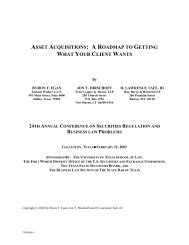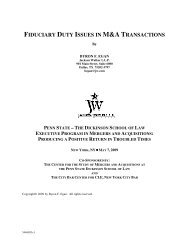busted m&a deals headed for litigation - Jackson Walker LLP
busted m&a deals headed for litigation - Jackson Walker LLP
busted m&a deals headed for litigation - Jackson Walker LLP
Create successful ePaper yourself
Turn your PDF publications into a flip-book with our unique Google optimized e-Paper software.
penalties, may differ depending on the structure of the transaction. Responsibility under the Worker<br />
Adjustment and Retraining Notification Act (“WARN Act”) can vary between the parties, depending<br />
upon whether the transaction is structured as an asset purchase, stock purchase or statutory<br />
combination. In a stock purchase or statutory combination, any collective bargaining agreements<br />
generally remain in effect. In an asset purchase, the status of collective bargaining agreements will<br />
depend upon whether the buyer is a “successor,” based on the continuity of the business and work<br />
<strong>for</strong>ce or provisions of the seller’s collective bargaining agreement. If it is a successor, the buyer<br />
must recognize and bargain with the union.<br />
IV.<br />
SUCCESSOR LIABILITY<br />
A. Background<br />
In any acquisition, regardless of <strong>for</strong>m, one of the most important issues to be resolved is what<br />
liabilities incurred by the seller prior to the closing are to be assumed by the buyer. Most of such<br />
liabilities will be known -- set <strong>for</strong>th in the representations and warranties of the seller in the<br />
acquisition agreement and in the exhibits thereto, reflected in the seller’s financial statements or<br />
otherwise disclosed by seller to buyer in the course of the negotiations and due diligence in the<br />
acquisition. For such known liabilities, the issue as to which will be assumed by the buyer and<br />
which will stay with the seller is resolved in the express terms of the acquisition agreement and is<br />
likely to be reflected in the price. For unknown liabilities, the solution is not so easy and lawyers<br />
representing principals in acquisition transactions spend significant time and ef<strong>for</strong>t dealing with the<br />
allocation of responsibility and risk in respect of such unknown liabilities.<br />
While all of the <strong>for</strong>egoing would pertain to an acquisition transaction in any <strong>for</strong>m, the legal<br />
presumption as to who bears the risk of undisclosed or un<strong>for</strong>seen liabilities differs markedly<br />
depending upon which of the three conventional acquisition structures has been chosen by the<br />
parties.<br />
• In a stock acquisition transaction, since the acquired corporation simply has new<br />
owners of its stock and has not changed in <strong>for</strong>m, the corporation retains all of its<br />
liabilities and obligations, known or unknown, to the same extent as it would have<br />
been responsible <strong>for</strong> such liabilities prior to the acquisition. In brief, the acquisition<br />
has had no effect whatsoever on the liabilities of the acquired corporation.<br />
• In a merger transaction, where the acquired corporation is merged out of existence,<br />
all of its liabilities are assumed, as a matter of state merger law, by the corporation<br />
which survives the merger. Unlike the stock acquisition transaction, a new entity<br />
will be responsible <strong>for</strong> the liabilities. However, the practical result is the same as in a<br />
stock transaction (i.e. the buyer will have assumed all of the preclosing liabilities of<br />
the acquired corporation as a matter of law).<br />
• By contrast, in an asset purchase, the contract between the parties is expected to<br />
determine which of the assets will be acquired by the buyer and which of the<br />
liabilities will be assumed by the buyer. Thus, the legal presumption is very different<br />
from the stock and merger transactions: the buyer will not assume liabilities of the<br />
selling corporation which the buyer has not expressly agreed to assume by contract.<br />
4032470v.1<br />
- 11 -

















